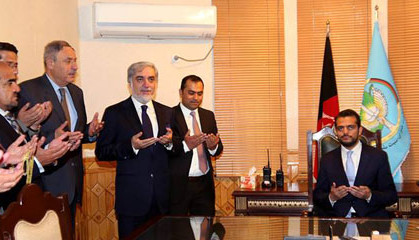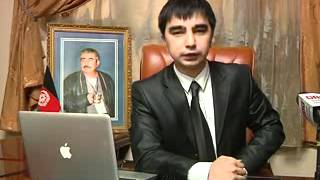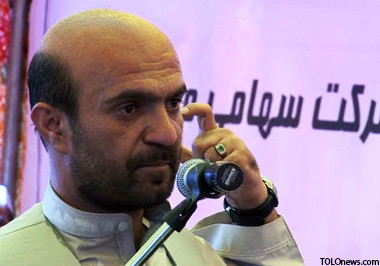By Sadaqat Ali
The ousting of the Taliban regime and the establishment of a new government in 2001 brought with it a hope for the emergence of a truly just and democratic society. Many were hopeful that the warlords would go behind bars for the atrocities they had committed during the 1990s.(1) On the contrary, they were reinforced during the Karzai’s administration. Regional(2) warlords and power brokers such as Atta Noor(3) in the North, Sherzai in the South and then East and Ismail Khan in the West of the country, turned the country into fiefdoms and often defied the presidential decrees if they were against their personal interests. This reinforcement of the warlords led to the hopelessness of many Afghans.
This sense of hope re-emerged when Ashraf Ghani, was elected as the President of the country. However, despite his election as president the internal political landscape of Afghanistan continues to be the same if not worse. For example many people in Afghanistan celebrated when Marshal Fahim, the ex- first vice president and a well known warlord, died, (prior to Ashraf Ghani’s election as the President). The Afghans thought it was the end of Fahim’s story.

Adib Faheem was given a high post in the NDS after his father's death. (Photo: Office of the Chief Executive)
However, under the new unity government led by Ashraf Ghani, the son of Marshal Fahim ‘Adib Fahim’ was designated as the second in command of Afghanistan’s national directorate of security. The key merit for his designation is the fact that he is the son of a warlord. Using this position he will remain loyal to the political and military interests of the Shora-e-Nizar rather than to the national interests of Afghanistan.
Not only that, but today we also see that even the drivers, bodyguards and cooks of these warlords enjoy important status and demonstrate their power from time to time. For example the bodyguards of another deceased-warlord’s son, Zahir Qadir, now the Deputy Speaker of the Afghan Parliament(4) beat an Afghan police officer in the capital Kabul in broad daylight without being prosecuted. The reason being, the police officer was implementing the Law in the interest of the public which was not compatible with the interests of the warlord or of his bodyguards. This is a clear indication that the new generation of the Afghan warlords is above the Law; thanks to the ineffective judiciary system of the country.

Batur Dostum, son of powerful warlord Abdul Rashid Dostum. (Screen grab from Youtube)
The warlords continue to have their own loyalists in the ranks of national police; a practice their new generation will inherit from them. Instead of enforcing the Laws of the country, these officers safeguard the interests of their masters while taking their salaries from the public funds. As a result the Law and Order situation continues to deteriorate in the country. Meanwhile, this new generation also knows how to exploit the process of democracy to remain in power. They have inherited from their fathers how to use their militia and financial strength to rig elections. Therefore a non-militant member of the public cannot dare running against a warlord’s son or his next of kin in the elections. Even when someone does run against them, he cannot win without the support or alliance of another warlord.
This politicisation of the security sector, militarisation of the politics, and nepotism in the state machinery are some of the key ways in which the aging warlords transfer their power to their new generation; normally their sons. Taking the mantles and politics of their fathers, the new generation of warlords (power brokers) will fall into the patronage and coercion ways(5) in order to maintain their power. This tradition will then be transferred to their later generations which will be a continuous challenge for the establishment of a just and democratic society in Afghanistan.

Abdul Zaher Qadir, deputy speaker of the Afghan Parliament. (Photo: TOLOnews.com)
If this culture of transfer of power continues, there will be virtually no space left for the educated Afghan youth from lower and middle class to manoeuvre effectively in the political arena of Afghanistan. This not only goes against the democratic norms but it also leads to the resentment and the alienation of citizens from the state and to the fact that the citizens become the sympathisers of anti-government elements.
It is normally the role of the national government to bring the adversaries to justice and give all the citizens of the country an equal opportunity to participate in the affairs of the country regardless of their background. But the problem is the Afghan government(6) itself is the adversary! The very composition of the current government is problematic. With the exception of Ashraf Ghani most of the other top leaders, including his first deputy, Abdul Rashid Dostum(7), derive their strength from the means of violence such as their private militia and not from the support of the people. In other words their source of power is violence and not peace.
Therefore, this requires the Afghan and International civil societies as well as the Afghan media to hold the Afghan government accountable for not bringing the violators of Law and Order to justice and for giving prominent government positions as gifts or inheritance rather than based on merit and competency.
Ensuring the above will give the ordinary educated Afghan youth the opportunity to participate fully in the affairs of their country with a sense of ownership to the country. It will also restore the trust of Afghans in the government which will contribute positively to the peacemaking efforts with the Taliban and handling the difficult relations with Pakistan; two of the biggest challenges facing the Afghan government.
References:
(1) http://www.rferl.org/content/afghanistan-report-atrocities-war-accountability/24656163.html
(2) http://thediplomat.com/2015/02/the-narco-state-of-afghanistan/
(3) http://articles.latimes.com/2010/jan/09/world/la-fg-afghan-warlord9-2010jan09
(4) http://www.rferl.org/content/afghan-government-militia-commander-beating-police-qadir/24790339.html
(6) http://www.latimes.com/opinion/op-ed/la-oe-chayes-afghanistan-elections-20140923-story.html
http://www.rawa.org/massoud_ussr.htm



